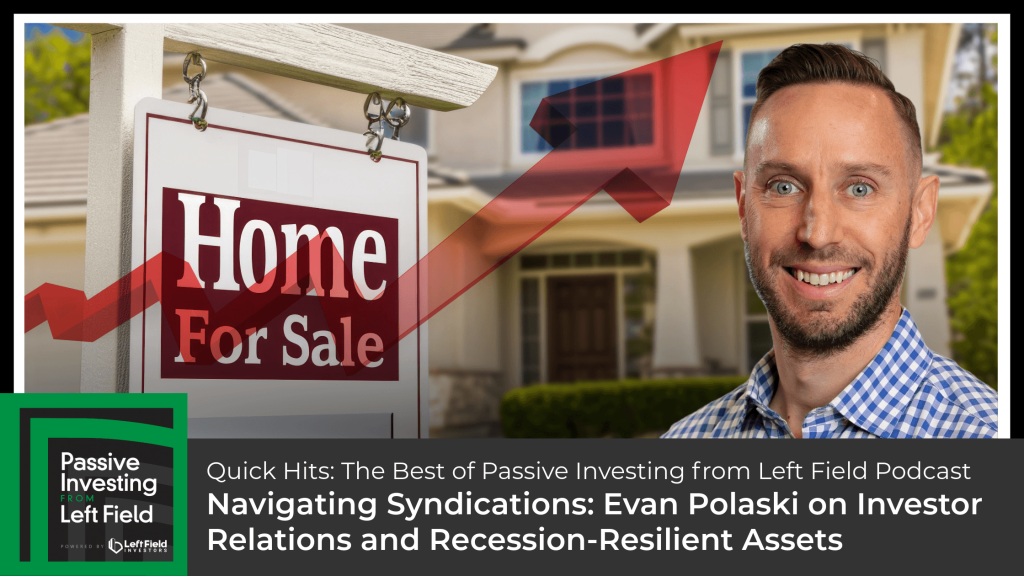Join host Jim Pfeifer, as he sits down with Evan Polaski, Director of Investor Relations at Axia Partners, to discuss the intricacies of real estate syndication investing. In this insightful episode, Evan shares his expertise on the critical role of investor relations, the tough questions every investor should ask, and Axia’s focus on recession-resilient asset classes. Dive in to learn the tools for effective due diligence and how to match deals with your investment goals.
The Pivotal Role of Investor Relations
As a seasoned professional with 17 years of experience in investor communications, Evan Polaski sheds light on the crucial role of investor relations in real estate syndication. He compares his position to being a liaison between investors and the company, stating, “I have to know everything, but I don’t have to do anything.”
Evan’s primary responsibility is to translate information between investors and the various departments within the company, such as acquisitions, finance, and property management. By maintaining open lines of communication, he ensures that investors’ needs and concerns are addressed while keeping them informed about the company’s operations and investment opportunities.
Tough Questions Every Investor Should Ask
When it comes to evaluating potential investments, Evan emphasizes the importance of asking the right questions. One of the most critical inquiries, he suggests, is understanding how much of the general partners’ (GPs) return comes from carried interest versus collective fees. This information can provide valuable insights into the alignment of interests between the GPs and the investors.
Another key question Evan recommends is inquiring about the number of employees investing in the deal. While specific names and amounts cannot be disclosed due to compliance regulations, knowing that a significant portion of the company’s staff is personally invested can be a positive indicator of their confidence in the investment opportunity.
Evan also stresses the importance of obtaining full financial statements, including income statements, balance sheets, and cash flow statements. These documents can reveal crucial information that may not be apparent in a simple profit and loss statement. Additionally, he advises investors to request sensitivity analyses to understand how changes in assumptions, such as rent growth, occupancy rates, and interest rates, can impact the investment’s performance.
Axia’s Focus on Recession-Resilient Asset Classes
Axia Partners specializes in investing in recession-resilient asset classes, primarily focusing on multifamily, industrial, self-storage, and RV parks. With approximately $150 million in assets under management, the company targets markets in the Mountain West and Sunbelt regions, leveraging their local expertise and market knowledge.
One of Axia’s most exciting projects is an industrial development deal south of Salt Lake City, strategically located along the I-15 and I-80 corridor. This high-growth area is well-positioned to benefit from the increasing demand for industrial space driven by the e-commerce boom.
Axia employs a diverse range of investment strategies, including value-add, ground-up development, and preferred equity positions with select operators. By diversifying their portfolio across asset classes and strategies, the company aims to create strong returns for investors while mitigating risk.
Matching Deals with Investment Goals
Evan emphasizes the importance of understanding your investment goals and matching them with the appropriate deals. He cautions against getting caught up in the excitement of a particular investment opportunity without considering how it aligns with your overall objectives.
For example, if your primary goal is to generate passive income, a value-add deal with significant renovations and potential for appreciation may not be the best fit. In such cases, a core asset with stable cash flow and lower risk might be more suitable. Evan advises investors to carefully evaluate the risks and returns associated with each investment strategy and ensure that they align with their personal goals and risk tolerance.
The Importance of Due Diligence
Throughout the episode, Evan stresses the importance of thorough due diligence when considering a real estate syndication investment. He recommends speaking with both the investor relations personnel and the principal operators to gain a comprehensive understanding of the investment opportunity.
While the investor relations team can provide valuable insights into the company’s operations and investment strategies, the principal operators can offer a more detailed perspective on the specific deal and its potential risks and rewards. Evan also highlights the significance of property managers and leasing agents in impacting investment outcomes, as they are the ones directly responsible for maintaining the property and ensuring tenant satisfaction.
In addition to speaking with key personnel, Evan advises investors to review the private placement memorandum (PPM) carefully. This document outlines the terms and conditions of the investment, including any potential risks and conflicts of interest. He cautions that any verbal representations made by the investor relations team or other company representatives may be superseded by the language in the PPM, so it is crucial to read and understand this document thoroughly.
Key Takeaways for Passive Investors
Evan Polaski’s insights provide valuable guidance for passive investors looking to navigate the world of real estate syndication. Some key takeaways from the episode include:
- Understand the role of investor relations and leverage their expertise to gain insights into the company’s operations and investment opportunities.
- Ask tough questions, particularly about the alignment of interests between GPs and investors, employee investment in the deal, and the sensitivity of the investment to changes in assumptions.
- Seek out recession-resilient asset classes and diversify your portfolio across different markets, asset types, and investment strategies.
- Match your investment goals with the appropriate deals, considering factors such as cash flow, appreciation potential, and risk tolerance.
- Conduct thorough due diligence by speaking with key personnel, reviewing financial statements, and carefully reading the PPM.
By following these guidelines and staying informed about the latest trends and opportunities in real estate syndication, passive investors can make more informed decisions and build a strong, diversified portfolio that aligns with their long-term financial goals.
Evan Polaski’s appearance on the Passive Investing from Left Field podcast offers a wealth of knowledge and practical advice for passive investors looking to navigate the complex world of real estate syndication. By understanding the role of investor relations, asking the right questions, and focusing on recession-resilient asset classes, investors can position themselves for success in this dynamic and rewarding field.
As Axia Partners continues to grow and expand its portfolio, Evan’s commitment to investor relations and transparent communication will undoubtedly play a crucial role in the company’s ongoing success. By staying attuned to the needs and concerns of their investors, Axia is well-positioned to capitalize on the opportunities that lie ahead in the ever-evolving real estate market.
If you enjoyed Evan Polaski’s wisdom and stories, the Left Field Investors (LFI) community offers more great resources to advance your real estate investing education.
Become an LFI “infielder” to access:
- Exclusive educational content and investor training programs
- Off-market investment opportunities from vetted sponsors
- A network of thousands of like-minded passive investors
- Virtual and in-person events to engage with experts
- The support to confidently build your investment portfolio
Whether you are new to passive real estate investing or a seasoned veteran, LFI provides the people, knowledge, and opportunities.
Join now to take your investing to the next level!








